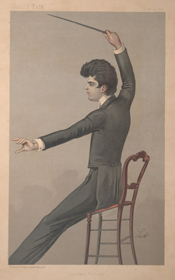
05 Feb 2007
MASCAGNI: Cavalleria Rusticana
Cavalleria Rusticana, melodramma in one act.
Mozart and Salieri, an opera in one act consisting of two scenes.
Nicolai Rimsky-Korsakov (1844-1908), composer. Libretto derived from Alexander Puskhin's play of the same name.
First performance: 7 December 1898 in Moscow.
Ariadne auf Naxos, Oper with a prologue and one act. Music composed by Richard Strauss. Libretto by Hugo von Hofmannsthal.
La Vestale, a tragédie lyrique in three acts.
Boris Godunov, an opera in four acts with prologue
Modest Mussorgsky, composer. Libretto by the composer, based on Alexander Pushkin's drama Boris Godunov and Nikolai Karamazin's History of the Russian Empire
First performance: 8 February 1874 at the Mariinsky Theatre, St. Petersburg
Il Trovatore, dramma in four parts.
Only a few months following the premiere of Der Rosenkavalier, Hugo von Hofmannsthal proposed a new opera to Richard Strauss based on Molière’s comedy-ballet, Le Bourgeois gentilhomme (in German, Der Bürger als Edelmann).
Die Entführung aus dem Serail, Singspiel in 3 Acts.
Music composed by Wolfgang Amadeus Mozart (1756–1791). Libretto by Johann Gottlieb Stephanie the Younger, based on an earlier libretto by
Christoph Friedrich Bretzner.
Die Entführung aus dem Serail, Singspiel in 3 Acts.
Music composed by Wolfgang Amadeus Mozart (1756–1791). Libretto by Johann Gottlieb Stephanie the Younger, based on an earlier libretto by
Christoph Friedrich Bretzner.
Arabella: Lyrische Komödie in three acts
Die Entführung aus dem Serail, Singspiel in 3 Acts.
Music composed by Wolfgang Amadeus Mozart (1756–1791). Libretto by Johann Gottlieb Stephanie the Younger, based on an earlier libretto by
Christoph Friedrich Bretzner.
La Gioconda, dramma lirico in four acts.
Music composed by Amilcare Ponchielli (1834–1886). Libretto by Arrigo Boito (under the pseudonym Tobia Gorrio), based upon Victor Hugo's Angelo, Tyrant of Padua (1835).
Don Carlo, an opera in four acts. Music composed by Giuseppe Verdi (1813–1901). Libretto by Joseph Méry and Camille Du Locle after Friedrich von Schiller’s dramatic poem Don Carlos, Infant von Spanien. Revised version in four acts (French text revised by Du Locle, Italian translation by Achille de Lauzières and Angelo Zanardini).
Un ballo in maschera, a melodramma in three acts.
Music composed by Giuseppe Verdi. Libretto by Antonio Somma, based upon the work of Eugène Scribe Gustave III ou Le bal masqué (1833)
Medea: Melodramma tragico in three acts.
Die Tote Stadt, an opera in three acts.
Music composed by Erich Wolfgang Korngold (1897-1957). Libretto by Paul Schott (Julius and E. W. Korngold) after the novel Bruges la morte by Georges Rodenbach.
Manon Lescaut, dramma lirico in quattro atti
Elektra: Tragedy in one act.
Una cosa rara, ossia Bellezza ed onestà. Dramma giocoso in two acts.
Music composed by Vicente Martín y Soler (1754–1806). Libretto by Lorenzo Da Ponte from the comedy La luna de la Sierra by Luis Vélez de Guevara.
Hamlet: Opéra in five acts. Music composed by Ambroise Thomas. Libretto by Michel Carré and Jules Barbier after The Tragedy of Hamlet, Prince of Denmark by William Shakespeare.
Das Liebesverbot: Grosse komische Oper in two acts.

Cavalleria Rusticana, melodramma in one act.
Streaming Audio
Music composed by Pietro Mascagni (1863-1945). Libretto by Giovanni Targioni-Tozzetti and Guido Menasci after Giovanni Verga’s play.
First Performance: 17 May 1890, Teatro Costanzi, Rome.
| Principal Characters: | |
| Santuzza, a young peasant woman | Soprano |
| Turiddu, a young peasant | Tenor |
| Mamma Lucia, his mother an innkeeper | Contralto |
| Alfio, a carrier | Baritone |
| Lola, Alfio’s wife | Mezzo-Soprano |
Setting: A village in Sicily on Easter Sunday 1880
Synopsis:
While the curtain is down, Turiddu sings. (Siciliana: “O Lola, lovely as the spring’s bright blooms.”) The action takes place before the church. Devout pantomime by the church-goers; behind the scene, chorus of peasants. (“Queen of Heaven.”) At last Santuzza and Lucia appear from opposite sides of the stage. (Santuzza: “Tell me, mamma Lucia.”) Turiddu is the lover of Santuzza and she believes he has discarded her for Lola; she has seen him entering the young woman’s house. The carrier Alfio, the husband of Lola, appears with the chorus and also says that he has seen Turiddu, but thinks nothing wrong of it. When Lucia, who has sent her son to Francofonte for wine, inquires further into the matter, she is asked to be silent by Santuzza. (Romanza: “Well do you know, good mamma.”)
After the chorus with Alfio has departed, Santuzza recites her wrongs. Turiddu loved Lola, but after his service in the army found her married to Alfio. He then entered into relations with Santuzza, and is now turning back to his former love. The alarmed Lucia enters the church with the peasants. Santuzza awaits Turiddu (Scene: “You, Santuzza”), who, however, treats her coldly and drives her to despair by leaving her and entering the church with Lola. (Duet: “Ah what folly”; Lola: “My king of roses.”) “You shall suffer in blood for this,” Santuzza exclaims, and discovers to the returning Alfio the unfaithfulness of Lola. (Duet: “God has sent you, neighbour Alfio.”) Breathing vengeance, the carrier resolves to kill Turiddu and departs with Santuzza. During the following orchestral music (Intermezzo) the stage remains empty.
Turiddu, Lola and the chorus emerge from the church; Turiddu sings a drinking song (“Hail the red wine, richly flowing”) and is then challenged by Alfio to a duel with knives after the manner of the Sicilians. Promising to follow Alfio he takes a moving farewell of his mother, and asks her to care for the unhappy Santuzza, whom he has so deeply wronged. After a short pause, Santuzza, followed by a crowd of women, rushes upon the stage, and with the stark cry of “Turiddu is dead," the opera ends abruptly.
Cavalleria rusticana, though it appears melodramatic even by modern operatic standards, is one of the few verismo operas that have consistently remained in the repertory.